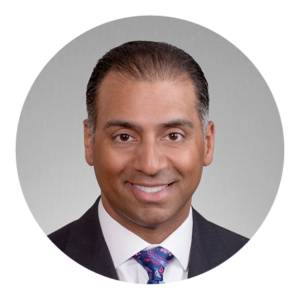Investor Spotlight: Hill Ward Henderson
September 25, 2019
 Since its inception in 1986, Hill Ward Henderson has grown steadily, based on a client-focused philosophy. This philosophy combines the talent, resources, capabilities and technologies of a large firm with the flexibility, responsiveness and personal attention of a smaller firm. The firm has as its cornerstone an obligation and a commitment to our valued clients of integrity, professionalism and timely, efficient delivery of quality legal services.
Since its inception in 1986, Hill Ward Henderson has grown steadily, based on a client-focused philosophy. This philosophy combines the talent, resources, capabilities and technologies of a large firm with the flexibility, responsiveness and personal attention of a smaller firm. The firm has as its cornerstone an obligation and a commitment to our valued clients of integrity, professionalism and timely, efficient delivery of quality legal services.
Ben Dachepalli, Shareholder and Co-Chair of the firm’s Construction & Design PracticeGroup
 As a Board-Certified Construction Attorney, Ben’s practice includes the negotiation and drafting of construction related agreements and complex construction litigation claims regarding contracts, construction defects, design errors, and construction liens. Ben represents owners, developers, contractors, construction managers, design professionals and subcontractors in all phases of the construction process. As a former Board Member of the Construction Industry Licensing Board for the State of Florida, Ben is also experienced in licensing matters for contractors and subcontractors.
As a Board-Certified Construction Attorney, Ben’s practice includes the negotiation and drafting of construction related agreements and complex construction litigation claims regarding contracts, construction defects, design errors, and construction liens. Ben represents owners, developers, contractors, construction managers, design professionals and subcontractors in all phases of the construction process. As a former Board Member of the Construction Industry Licensing Board for the State of Florida, Ben is also experienced in licensing matters for contractors and subcontractors.
In your opinion, what do you think was the biggest win for our community in the past few years?
Overall, the Riverwalk development has been a major win for the city, tying the community together, and connecting multiple areas that were previously inaccessible to one another by foot. Importantly, the Riverwalk also helped create a footprint for Strategic Property Partners’ development of the Water Street District and Soho Capital’s development of Tampa Heights. As a result, those two developments are changing Tampa’s skyline and enhancing the “live-work-play” opportunities for young and mature professionals that are moving into the downtown core. This educated workforce now has a reason to relocate to Tampa.
Speaking of which, investment in the technology start-up community is proving to be a huge win as well. Start-up support organizations such as Embarc Collective, Florida Funders, Tampa Bay Wave, Florida-Israel Business Accelerator and many others have taken root and are becoming integral to growing and promoting Tampa as a destination for technology companies. Instead of talent leaving to go to other cities, start-up companies and professionals are relocating to Tampa and bringing a whole new entrepreneurial spirit to the city.
You practice in the area of construction law, and Tampa is seeing an unprecedented amount of transformative redevelopment projects and new mixed-use developments. How will this impact our area and how do you think the federal Opportunity Zone program will affect this redevelopment and our area in general?
This unprecedented redevelopment is very exciting. The most notable trend has been a significant increase in the number of large mixed-use developments being built, such as Water Street, Tampa Heights, West River Redevelopment and Midtown Tampa. Because Tampa had not experienced many mixed-use developments in years, the reality of these projects makes it that much more exciting. The increase in people moving to Tampa has created demand for new housing, which has resulted in many residential and multi-family projects, both small and large, springing up throughout the region. Unfortunately, the rapid pace of redevelopment and new construction has created a negative impact on labor resources within the construction industry. There simply aren’t enough skilled trades and labor available to satisfy the number of projects coming out of the ground. Because the pool of available trades and skilled labor is so limited, many projects may experience delays and cost-overruns.
The Opportunity Zone program will certainly help increase redevelopment in our area because it provides significant tax incentives for development and redevelopment projects within economically depressed areas and low-income communities. By encouraging redevelopment and investments in such “opportunity zones,” the program is meant to increase economic development and jobs in the neighborhoods that need it most. Hill Ward Henderson has worked with, and continues to work with, developers, investors, and fund sponsors on these projects, and we are excited to see how they progress and take shape.
You were appointed to the Tampa Housing Authority earlier this year. So many markets across the country that experienced a burst of popularity and influx of growth are now struggling with affordable housing. As our market continues to grow how can we maintain affordable and attainable housing options?
Maintaining affordable housing options has become an increasingly difficult process because funds for these types of redevelopment or new construction projects are limited. The best way to maintain these affordable housing options is through partnerships with developers that are willing to build new construction projects in our community. In the case of the Tampa Housing Authority, we are landowners; which makes it easier for us to attract construction partners with the means to assist us in our goal to develop more affordable housing for our community. The West River Redevelopment plan is a great example of this. If it weren’t for these partnerships, we would have to rely almost exclusively on assistance from state and federal government financing programs or traditional banking partnerships.
Cities, counties and other municipalities should be encouraged to set aside more land for affordable housing, as well as green space for parks and recreation. Tampa is in a luxury housing boom and we must remember that many thousands of residents still struggle to keep a roof over their heads. The opportunities for homeownership represent stability; a place for families to grow and an investment that can be passed on to their family members. In addition, homeownership is proven to boost education, health and safety outcomes – all of which will help the overall economic health of our community.
We can also maintain affordable housing by ensuring Florida’s affordable housing trust funds are actually set aside and used for affordable housing programs, which includes funds for low-income home repairs due to extreme weather and natural disasters, homeownership programs that provide down-payment and mortgage assistance, and funds to rehabilitate and build apartments for vulnerable populations. This can mean the difference between being able to purchase a forever home or being forced to move one’s family year after year, in a hunt for affordable rent with no reasonable hope in sight.
Lastly, why is it important for companies to support economic development efforts?
Because it helps everyone. Large, mid-sized and small businesses benefit from what the EDC does in this region to attract more talent and companies to Tampa. This effort leads to increased employment opportunities and industry diversification. As the region diversifies its employer base, it can better withstand an economic downturn. An increased presence of companies in the region also translates to increased tax revenue for community projects and local infrastructure, which raises the standard of living for all of us.
